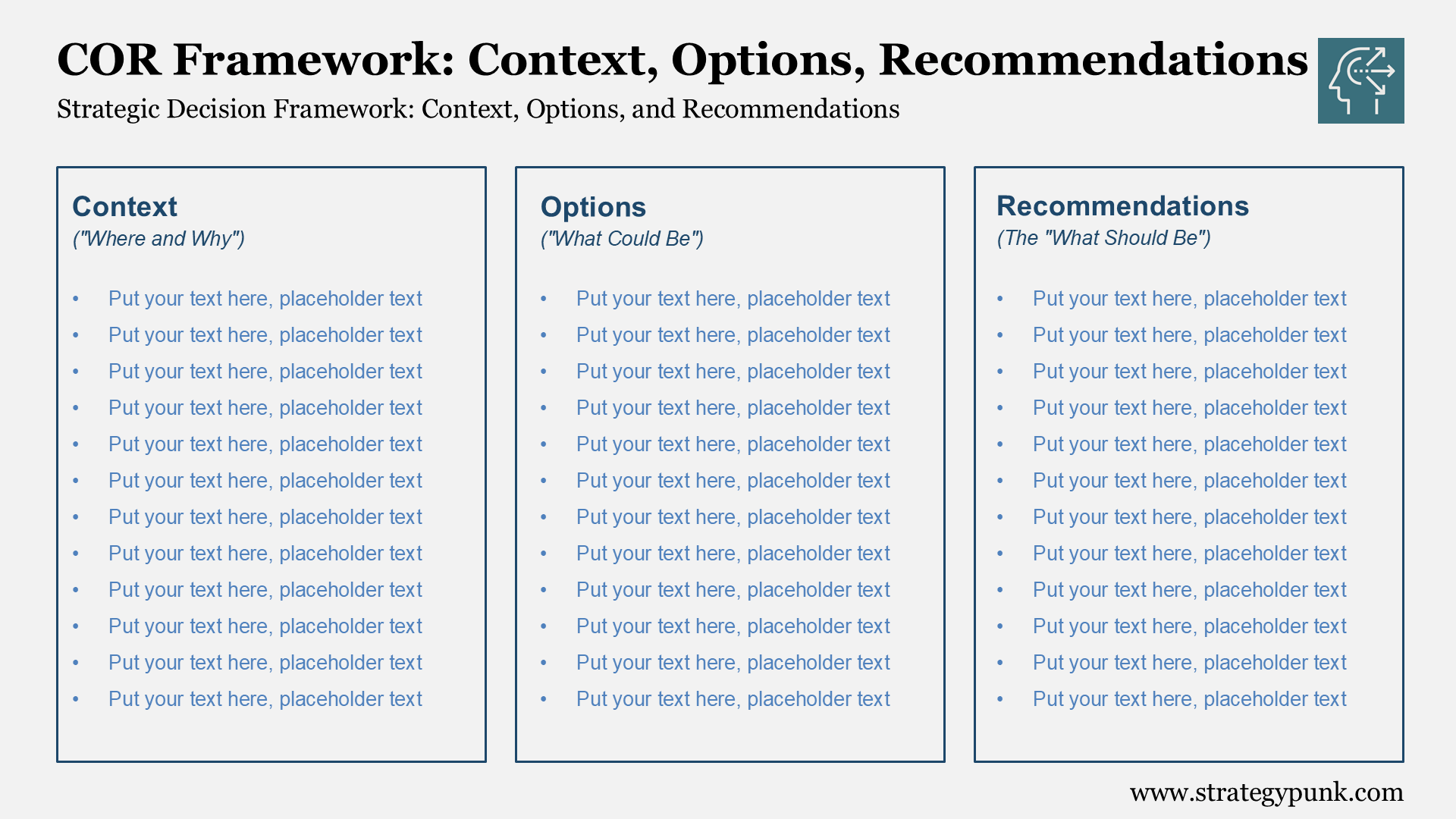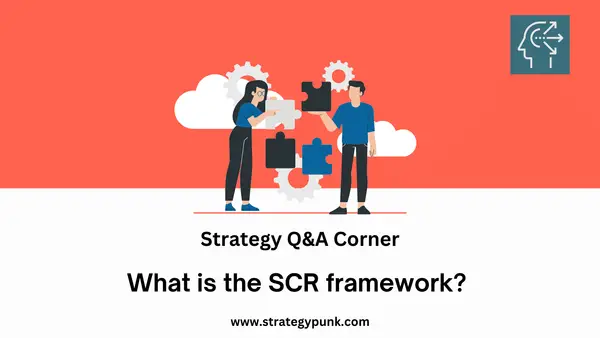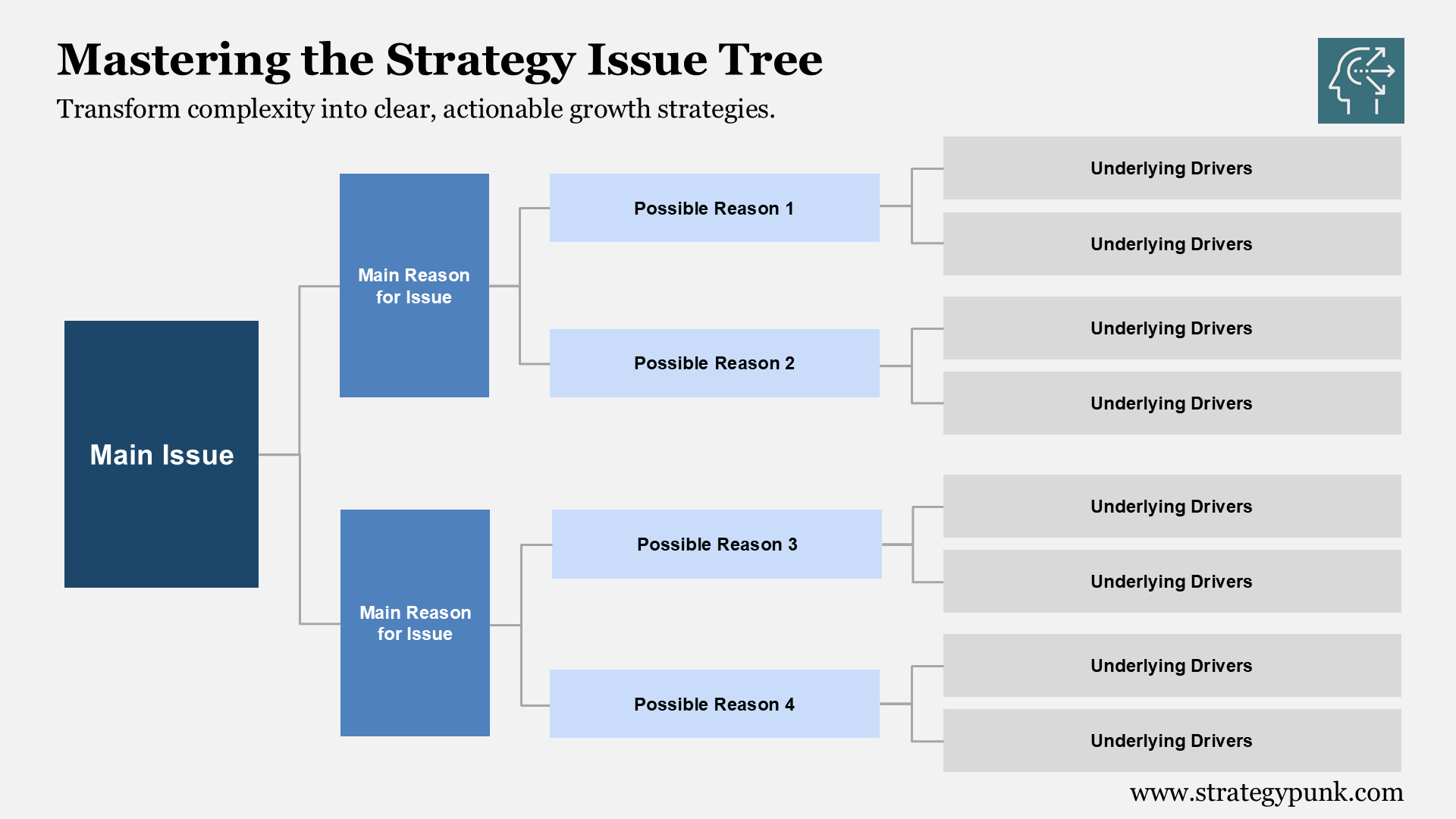Strategy to Success: Unleashing the 7 Crucial Leadership Skills (Free Template)
Explore the '7 Crucial Leadership Skills' that define effective leaders. This in-depth guide empowers you with practical tips on strategy, recruiting, decision-making, and more. Download our free PDF template and start your journey towards superior leadership today!
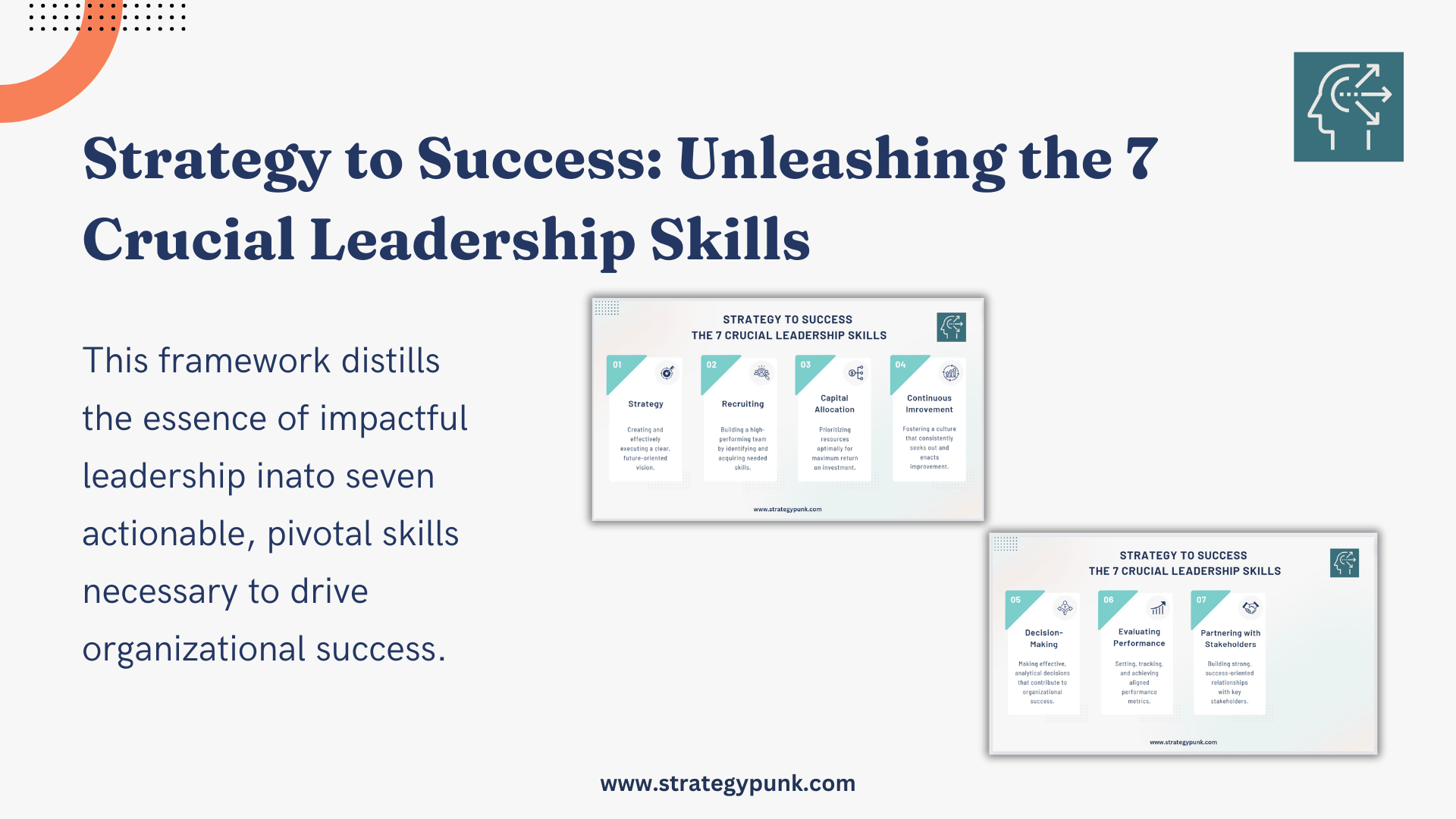
Introduction
As a leader, possessing core skills that will help you succeed is crucial. Leaders ' seven essential skills are capital allocation, strategy, continuous improvement, recruiting, decision-making, critically evaluating performance, and radical partnership. These skills are fundamental for any leader to achieve their goals and lead their team to success.
Capital allocation is one of the essential skills that a leader should possess. It involves making informed decisions about where to invest resources to achieve the best possible outcome. A leader's ability to allocate resources effectively can significantly impact the organization's success. Similarly, strategy is another critical skill that a leader must have. It involves setting goals, developing plans, and making decisions to achieve those goals. A leader's ability to build and execute a well-defined strategy is crucial to their success.
Continuous improvement is another vital skill that a leader must possess. It involves a commitment to ongoing learning and development for themselves and their team. Recruiting is also a crucial skill for a leader. It consists in identifying and attracting the right talent to the organization. A leader's ability to recruit effectively can help to build a solid and successful team. Decision-making, critically evaluating performance, and radical partnership are essential skills every leader should have. These skills allow leaders to make informed decisions, evaluate their team's performance, and build strong partnerships to achieve their goals.
Understanding Leadership
The Importance of Leadership
Leadership is crucial to any organization, whether a small business or a large corporation. As a leader, you guide your team towards achieving the organization's goals. You must possess several core skills to be an effective leader, including capital allocation, strategy, continuous improvement, recruiting, decision-making, critically evaluating performance, and radical partnership.
Capital allocation is deciding where to invest the organization's resources. As a leader, you must clearly understand the organization's financial goals and allocate resources accordingly. This skill is essential for ensuring the long-term success of the organization.
Strategy is another critical skill for any leader. You'll need to develop a clear vision for the organization and create a plan to achieve that vision. This involves analyzing the organization's strengths and weaknesses and identifying opportunities and threats in the market.
Continuous improvement is constantly evaluating and improving the organization's processes and procedures. As a leader, you must identify areas for improvement and implement changes to enhance the organization's performance.
Recruiting is another essential skill for any leader. You must be able to identify and attract top talent to the organization. This involves creating a strong employer brand and developing effective recruitment strategies.
Decision-making is a critical skill for any leader. You must be able to make informed decisions quickly and effectively. This involves analyzing data, considering all possible options, and weighing the pros and cons of each decision.
Critically evaluating performance is the process of assessing the organization's performance and identifying areas for improvement. As a leader, you must be able to objectively evaluate performance and implement changes to enhance the organization's effectiveness.
We are forming strategic partnerships with other organizations to achieve common goals. As a leader, you must be able to identify potential partners and develop effective partnership strategies.
In conclusion, leadership is a critical aspect of any organization, and possessing the core skills of capital allocation, strategy, continuous improvement, recruiting, decision-making, critically evaluating performance, and radical partnership is essential for success. As a leader, you must be committed to developing and using these skills to guide your team towards achieving the organization's goals.
7 Crucial Leadership Skills
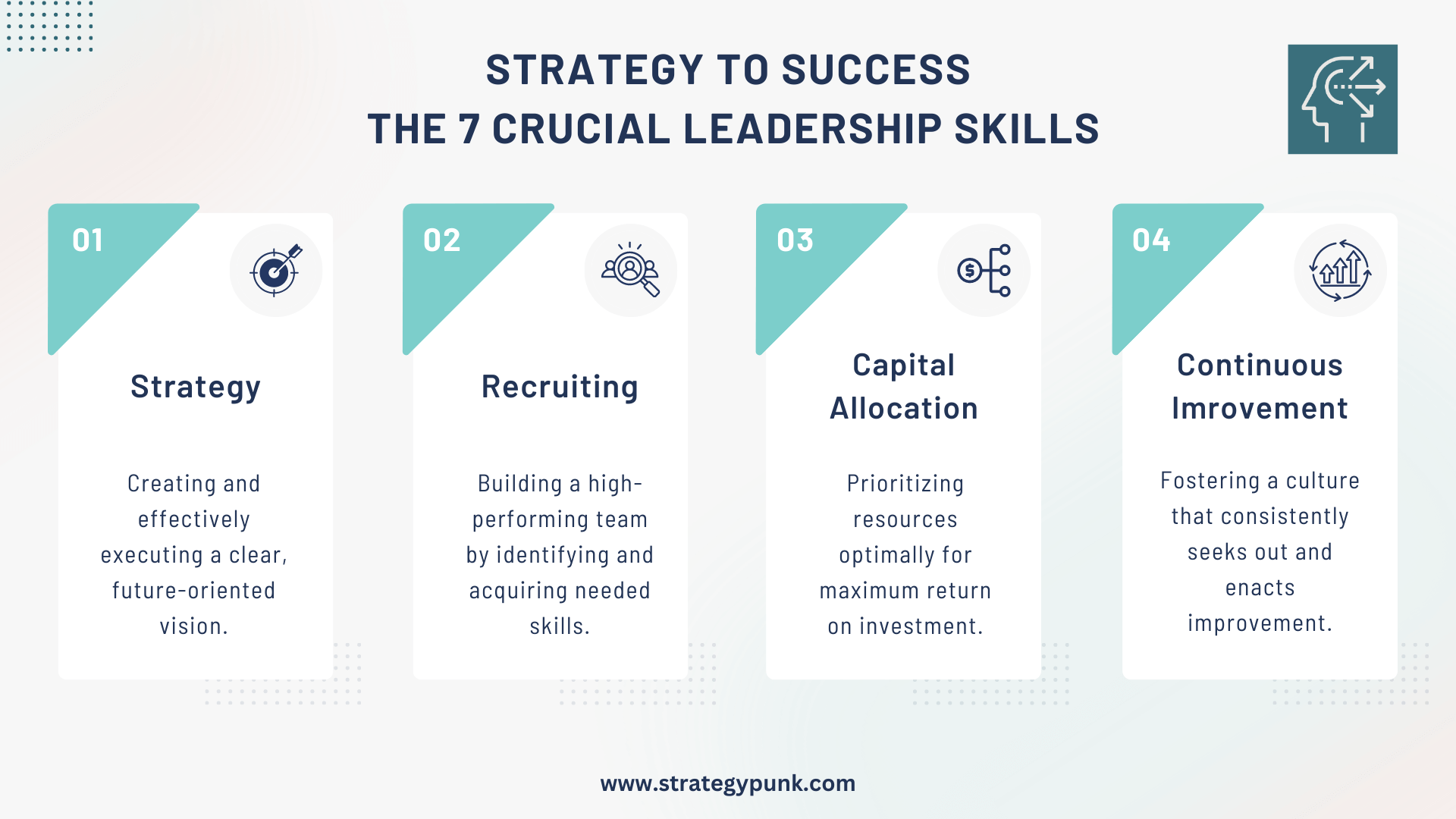
Core Skill 1: Strategy
To be an effective leader, you must possess the core skill of strategy. This involves developing compelling strategies to achieve long-term goals. To do this, you must first define your dream outcome. What is it that you want to accomplish in the long run? Once you have defined your dream outcome, you must break it down into specific goals. This will help you create a roadmap to guide your journey.
I think it's essential to review and adjust your strategy as needed regularly. This will ensure that you stay on track and progress towards your goals. As a leader, you must be able to think critically and make tough decisions regarding strategy.
To develop your skills in this area, consider studying successful leaders and their strategies. Please look for patterns and best practices to incorporate into your approach.
Just to remind you, strategy is not a one-time event. It's an ongoing process that requires constant attention and refinement.
Related Posts:
Core Skill 2: Recruiting
Recruiting is a critical core skill for any leader. To build a successful team, you must obsess over finding talent. Cultivate positive, motivated, and inspiring people who can provide guidance, accountability, and new opportunities. Here are some essential tips to help you excel at recruiting:
- Clearly define the skills and qualities you are looking for in a candidate. Create a job description that outlines the essential responsibilities and qualifications required for the role.
- Use a variety of sourcing methods to find potential candidates. Leverage your personal and professional networks, post job listings on relevant job boards, and use social media to promote the position.
- Screen candidates carefully to ensure they meet the qualifications for the role. Conduct phone and in-person interviews to assess their skills, experience, and cultural fit.
- Make sure you are selling the opportunity to candidates. Highlight the benefits of working for your organization and why the role fits their career goals.
- Provide a positive candidate experience. Be responsive, transparent, and professional throughout the recruitment process.
These tips can build a talented and motivated team to drive your organization's success.
Related Posts:
- The 4 Cs of Hiring Great Employees (Free Template)
- Executive Leadership Team Performance Evaluation Tool
Core Skill 3: Capital Allocation
To be a successful leader, you must possess core capital allocation skills. This skill involves allocating resources to maximize returns for your organization. To do this effectively, you must first identify what truly matters to you and your organization. Once you have placed your priorities, you can ruthlessly focus on them.
One way to do this is by creating a table that outlines your priorities and the resources required to achieve them. This will help you make informed decisions about allocating your resources. Additionally, you should continuously evaluate your choices to ensure that you are maximizing returns.
It's important to note that capital allocation is not just about financial resources. It also involves allocating your time, energy, and talent. As a leader, you must be able to identify the resources that are most valuable to your organization and give them accordingly.
In summary, capital allocation is a critical core skill for any leader. By identifying what truly matters to you, setting priorities, and ruthlessly focusing on them, you can allocate your resources to maximize returns and drive success for your organization.
Core Skill 4: Continuous Improvement
Continuous improvement is a crucial skill for any leader. As a leader, you should always seek new knowledge, acquire new skills, and curate new experiences to improve yourself and your team. This skill involves a willingness to learn and adapt to new situations and a commitment to self-improvement.
To continuously improve, you should focus on identifying areas where you can improve and setting goals to achieve those improvements. This may involve seeking feedback from others, analyzing your performance, or researching to identify best practices.
One effective tool for continuous improvement is the Impact Effort Matrix, which evaluates the importance of any endeavor by impact and effort. This decision-making tool can help you prioritize your efforts and focus on the areas with the most significant impact.
By continuously improving yourself and your team, you can stay ahead of the competition and achieve tremendous organizational success.
Related Posts:
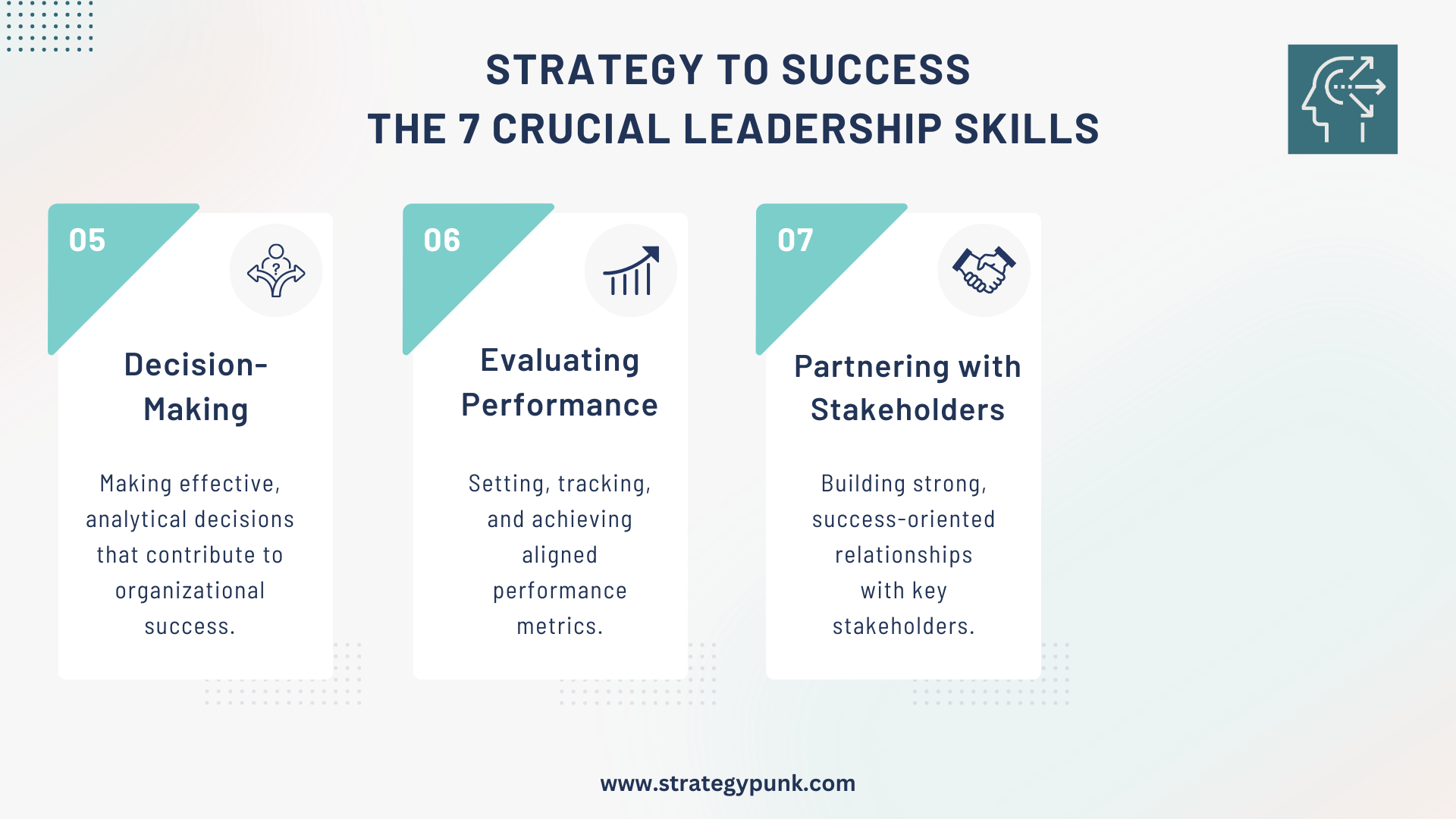
Core Skill 5: Decision-Making
As a leader, one of your core skills is decision-making. It would be best if you made tough decisions to drive progress. To cultivate strong analytical skills, write down critical choices, consider potential risks and rewards, and then courageously execute.
Effective decision-making requires a thoughtful and systematic approach. One way to approach decision-making is to use a problem-solving process like the 7-step or 5W1H method. These methods help you identify the problem, gather relevant information, analyze the data, and develop and implement a solution.
Another helpful tool is the DARE model, which stands for Data, Alternatives, Risks, and Evaluation. This model helps you gather and analyze data, generate alternatives, evaluate potential risks, and decide based on the best available information.
Remember that decision-making is about making the right choice and confidently executing that choice. This requires effective communication and leadership skills to ensure everyone is on board with the decision and knows their role in implementing it.
Related Posts:
- Master the 7-Step Problem-Solving Process for Better Decision-Making
- 5W1H Method: Unlocking the Secrets of Effective Problem-Solving
- Master Effective Decision-Making with the DARE Model: A Comprehensive Guide and Template
Core Skill 6: Evaluating Performance
Critically evaluating performance is a core skill of a leader. To do this effectively, you must set clear measures that align with your goals and regularly track your progress. Stop lying to yourself and live by the numbers. This will allow you to make data-driven decisions and identify areas for improvement.
One way to evaluate performance is by conducting regular performance reviews with your team members. This allows you to provide feedback on their performance and identify areas for development. It also allows your team members to provide feedback on your leadership style and suggest areas for improvement.
Another way to evaluate performance is by setting up a system for tracking key performance indicators (KPIs). This allows you to monitor progress towards your goals and identify areas to adjust. It also helps you to identify trends and patterns in your data, which can inform your decision-making.
In addition to tracking KPIs, gathering feedback from your customers, stakeholders, and other key stakeholders is essential. This can help you identify areas where you need to improve your products or services and places where you can improve your communication and collaboration.
You can become a more effective leader and drive your team towards success by mastering evaluating performance.
Related Posts:
Core Skill 7: Partnering with Stakeholders
Partnering with stakeholders is crucial as a leader to help you achieve your organization's goals. By building solid relationships with all relevant stakeholders, including employees, customers, suppliers, and investors, you can gain valuable insights, foster trust, and create a shared vision for success.
To effectively partner with stakeholders, you must take responsibility and take ownership of your actions. I think it would be best if you communicated openly and transparently, listened actively to feedback, and were willing to adapt your approach based on the needs and expectations of your stakeholders.
One way to improve your stakeholder communications is using the RPM Status Update Framework. This framework involves reflecting on your progress, presenting your findings, and mapping your next steps. Following this process can keep stakeholders informed and engaged and build stronger relationships.
In addition to building relationships with stakeholders, working closely with your board of directors is essential. By collaborating with your board, you can ensure that your organization is aligned with its strategic goals and has the resources and support you need to succeed.
Partnering with stakeholders is a core skill that can help you achieve your leadership goals. Building solid relationships, seeking responsibility, and communicating effectively can create a culture of trust, transparency, and shared success.
Related Posts:
Frequently Asked Questions
What are the critical skills that make a leader effective?
Influential leaders possess various skills, including capital allocation, strategic thinking, continuous improvement, recruiting, decision-making, critically evaluating performance, and radical partnership. These skills enable leaders to create a vision, develop a plan, and execute it effectively.
How important is capital allocation in leadership?
Capital allocation is a critical skill for leaders because it involves making decisions about allocating resources effectively to achieve business goals. Leaders must be able to evaluate investment opportunities, assess risks, and give capital to maximize stakeholder returns.
What are some examples of strategic leadership?
Strategic leadership involves creating a vision, developing a plan, and executing it effectively. Some examples of strategic leadership include developing a new product line, entering a new market, or restructuring a company to improve efficiency.
What is the role of continuous improvement in leadership?
Continuous improvement is essential for leaders because it enables them to identify areas for improvement and implement changes that increase efficiency and effectiveness. Leaders must be able to evaluate processes, identify areas for improvement, and implement changes that drive results.
Why is recruiting an essential skill for leaders?
Recruiting is a critical skill for leaders because it involves identifying and attracting top talent. Leaders must be able to evaluate candidates, assess their skills and experience, and make hiring decisions that align with the organization's goals and culture.
How does critically evaluating performance contribute to effective leadership?
Critically evaluating performance is essential for leaders because it enables them to identify areas for improvement and provide constructive feedback to their team members. Leaders must be able to assess performance objectively, provide feedback that is specific and actionable, and create a culture of continuous improvement.
What are the short-term and long-term goals for each of the 7 crucial leadership skills?
The skills crucial to leadership success encompass strategy, recruiting, capital allocation, continuous improvement, decision-making, performance evaluation, and partnering with stakeholders.
Each of these seven skills requires unique short-term and long-term goals for development and success measurement.
1. Strategy
- Short-term goal: Define and establish a clear vision for the future with a detailed roadmap to reach it.
- Long-term goal: Achieve the desired outcome while continuously refining strategies.
- Success Measurement: Successful execution of strategies, achievement of strategic goals, and enhancement of business growth and profitability.
2. Recruiting
- Short-term goal: Identify the skills required for various roles and create a robust hiring process.
- Long-term goal: Develop a high-performing and committed team.
- Success Measurement: Quality and performance of hires, team engagement, and lower turnover rates.
3. Capital Allocation
- Short-term goal: Identify organizational priorities and allocate resources accordingly.
- Long-term goal: Optimize resource allocation to drive maximum returns.
- Success Measurement: Return on investment (ROI), organizational growth, and key performance indicators (KPIs) achievement.
4. Continuous Improvement
- Short-term goal: Identify areas of personal and team improvement.
- Long-term goal: Cultivate a culture of continuous learning and improvement.
- Success Measurement: Increased productivity, quality of work, and satisfaction rates among team members.
5. Decision-Making
- Short-term goal: Enhance analytical skills and implement systematic decision-making processes.
- Long-term goal: Make effective decisions contributing to the organization's success.
- Success Measurement: Outcomes of decisions, improved problem-solving, and increased organizational performance.
6. Evaluating Performance
- Short-term goal: Establish performance metrics aligned with organizational goals.
- Long-term goal: Regularly track performance and drive improvements.
- Success Measurement: Achievement of KPIs, improvement in team performance, and customer satisfaction.
7. Partnering with Stakeholders
- Short-term goal: Build strong relationships with key stakeholders.
- Long-term goal: Foster trust and create a shared vision for success with stakeholders.
- Success Measurement: Stakeholder satisfaction, improved communication, and shared goal achievement.
Each of these skills contributes significantly to leadership effectiveness. By setting specific goals and measures for each, leaders can track their progress and make necessary adjustments to maximize their leadership potential.
Conclusion
The Impact of Effective Leadership
As a leader, possessing the 7 core skills discussed in this article can significantly impact your team and organization. Effective capital allocation can increase profits and growth, while a well-crafted strategy can provide direction and focus. Continuous improvement ensures that your team always strives to improve, and recruiting the right people can create a solid and capable team.
Good decision-making can save time and resources, while critically evaluating performance can identify improvement areas. Finally, radical partnerships can lead to innovative solutions and new opportunities.
You can become a more effective leader by mastering these skills, inspiring your team to achieve their best, and driving your organization towards success.
Strategy to Success: Unleashing the 7 Crucial Leadership Skills
- Strategy: Creating and effectively executing a clear, future-oriented vision.
- Recruiting: Building a high-performing team by identifying and acquiring needed skills.
- Capital Allocation: Prioritizing resources optimally for maximum return on investment.
- Continuous Improvement: Fostering a culture that consistently seeks and enacts improvement.
- Decision-Making: Making effective, analytical decisions that contribute to organizational success.
- Evaluating Performance: Setting, tracking, and achieving aligned performance metrics.
- Partnering with Stakeholders: Building solid and success-oriented relationships with key stakeholders.
Strategy to Success: Unleashing the 7 Crucial Leadership Skills PDF Template
This concise, easy-to-use PDF template is a practical guide to mastering "Strategy to Success: Unleashing the 7 Crucial Leadership Skills," providing a structured approach to developing and fine-tuning the critical skills required for effective leadership.


